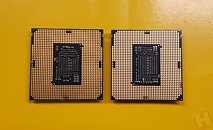- Joined
- Oct 9, 2007
- Messages
- 47,752 (7.42/day)
- Location
- Dublin, Ireland
| System Name | RBMK-1000 |
|---|---|
| Processor | AMD Ryzen 7 5700G |
| Motherboard | Gigabyte B550 AORUS Elite V2 |
| Cooling | DeepCool Gammax L240 V2 |
| Memory | 2x 16GB DDR4-3200 |
| Video Card(s) | Galax RTX 4070 Ti EX |
| Storage | Samsung 990 1TB |
| Display(s) | BenQ 1440p 60 Hz 27-inch |
| Case | Corsair Carbide 100R |
| Audio Device(s) | ASUS SupremeFX S1220A |
| Power Supply | Cooler Master MWE Gold 650W |
| Mouse | ASUS ROG Strix Impact |
| Keyboard | Gamdias Hermes E2 |
| Software | Windows 11 Pro |
The upcoming Intel 300-series chipset, and LGA1151 socket continues to be a source of chaos for PC builders. While the 100-series and 200-series chipset based motherboards support both 6th generation Core "Skylake," and 7th generation Core "Kaby Lake" processors, they will not support the upcoming 8th generation Core "Coffee Lake" chips. What's more, the upcoming 300-series chipset motherboards, which were earlier believed to feature backwards-compatibility for "Skylake" and "Kaby Lake" chips, will not support them, according to a Hardware.info report.
The LGA1151 socket between the two platforms remains unchanged, down to the package notches, which are designed to prevent you from installing a processor on an incompatible motherboard (eg: LGA1150 processors on LGA1151 motherboards). This isn't even a case like the incompatibility between LGA2011 and LGA2011v3, where the latter features DDR4 memory I/O, compared to the former's DDR3. Platform segmentation, and synthetically keeping up with a product development cycle, by forcing people to upgrade motherboards every two generations, appears to be Intel's primary motivation. The Hardware.info report, however, doesn't rule out the possibility of 300-series chipset motherboards getting support for older LGA1151 processors in the future, through BIOS updates.

View at TechPowerUp Main Site
The LGA1151 socket between the two platforms remains unchanged, down to the package notches, which are designed to prevent you from installing a processor on an incompatible motherboard (eg: LGA1150 processors on LGA1151 motherboards). This isn't even a case like the incompatibility between LGA2011 and LGA2011v3, where the latter features DDR4 memory I/O, compared to the former's DDR3. Platform segmentation, and synthetically keeping up with a product development cycle, by forcing people to upgrade motherboards every two generations, appears to be Intel's primary motivation. The Hardware.info report, however, doesn't rule out the possibility of 300-series chipset motherboards getting support for older LGA1151 processors in the future, through BIOS updates.

View at TechPowerUp Main Site








